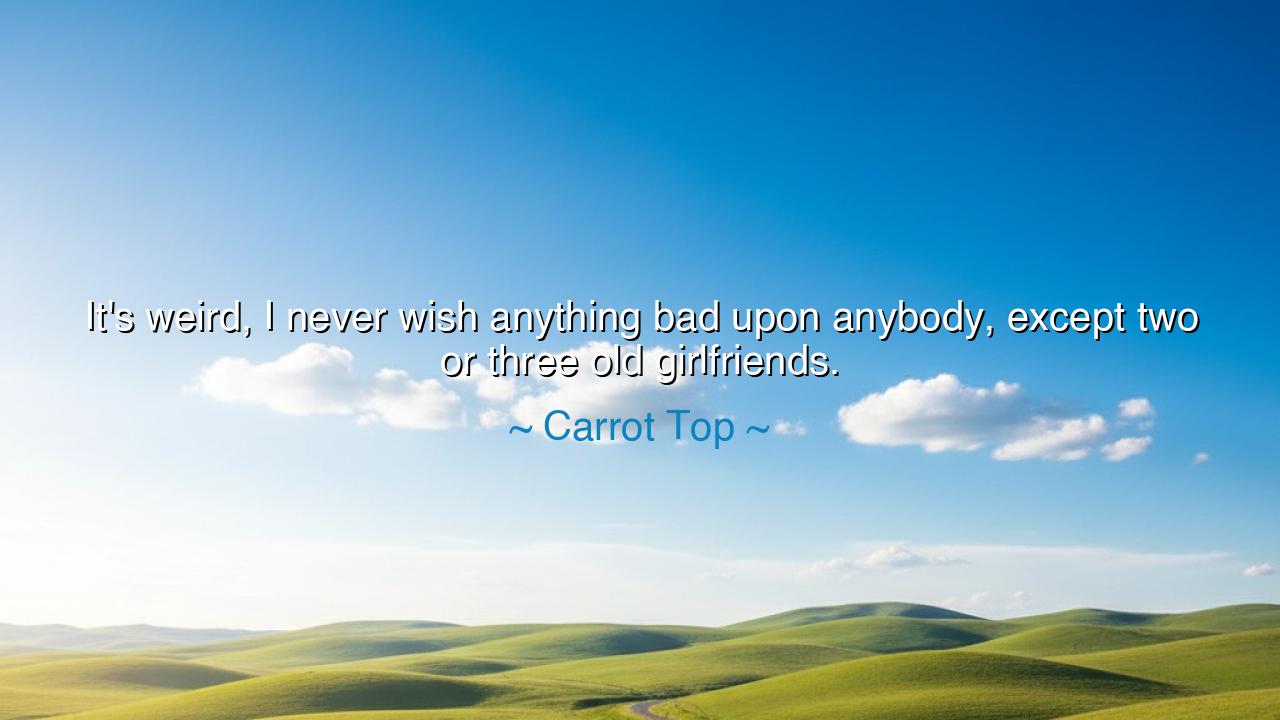
It's weird, I never wish anything bad upon anybody, except two or
It's weird, I never wish anything bad upon anybody, except two or three old girlfriends.






When Carrot Top uttered the words, “It’s weird, I never wish anything bad upon anybody, except two or three old girlfriends,” he cloaked timeless human emotion in the garb of humor. His jest, though light in tone, speaks of the deep struggle between forgiveness and resentment — the ancient battle of the heart between mercy and memory. Through laughter, he gives voice to what many conceal: that even the gentlest soul, even the one who strives for peace, carries scars that sometimes whisper of old wounds. Beneath his comedic confession lies a profound truth — that to live is to love, and to love is to risk the pain that tempts the spirit toward bitterness.
At first hearing, his words seem playful, almost trivial, yet the wisdom they conceal is eternal. To wish ill upon none is a high virtue, but few can walk through life without moments of anger, betrayal, or regret. The “two or three old girlfriends” stand not merely for past lovers, but for all those who have wounded us when our hearts were open, when our trust was given freely. In ancient times, such wounds were described as arrows lodged in the soul — sharp not because of malice alone, but because they came from those we once called beloved. Even when we heal, some part of the heart remembers. The humor in Carrot Top’s words is thus the laughter of recognition — the laughter of one who knows that even the kindest of us are still human.
Throughout the ages, the wise have taught that true strength lies not in avoiding hurt, but in transcending it. Consider the tale of King David of Israel, betrayed by his own son Absalom, who rose in rebellion against him. When Absalom died in battle, David did not rejoice in vengeance. He wept, crying, “O Absalom, my son, my son!” For though David had every reason to curse his betrayer, love remained stronger than wrath. His heart, though broken, chose compassion over hatred. In this, he embodied the lesson hidden within Carrot Top’s jest: that we may feel the sting of bitterness, yet we must not let it master us.
Still, there is something profoundly human in the comedian’s admission. For humor often arises where perfection fails. The man who admits to a flicker of spite does not celebrate cruelty — he confesses to his own imperfection. In that honesty, there is humility. The ancients called this the balance of the soul: to know one’s shadows without becoming them, to recognize the storm within without surrendering to it. Carrot Top’s humor, then, becomes a form of self-knowledge — a playful acknowledgment that the road to forgiveness is not easy, but it begins with truth.
Moreover, his words remind us that laughter itself is medicine. To speak of pain with levity is not to mock it, but to master it. The one who can laugh at his own wounds is already halfway to healing. In this way, humor becomes a bridge between suffering and wisdom. Even the great philosophers — from Epictetus to Montaigne — taught that detachment and perspective are keys to peace. The jester, the comedian, becomes the philosopher of the heart, teaching through laughter what the sage teaches through silence: that to forgive is divine, but to smile at one’s frailty is profoundly human.
Yet, we must not mistake this lightness for indifference. Carrot Top’s jest carries within it the echo of longing — the wish that those who once hurt us might have chosen kindness instead. To wish “bad upon two or three old girlfriends” is to acknowledge unresolved pain, the kind that lingers in the quiet corners of memory. But by expressing it in humor, he transforms bitterness into harmless jest. The laughter becomes a shield — not against others, but against despair. For the heart that can laugh has not hardened; it still beats, still feels, still forgives — even if imperfectly.
And so, O listener, take this teaching into your own heart: acknowledge your hurt, but do not dwell in it. If bitterness rises, let it pass like a shadow at dusk. Laugh at your wounds, for laughter is a form of grace. When you find yourself tempted to curse those who wronged you, remember that resentment binds you to the past, while humor frees you from it. Practice kindness not because others deserve it, but because your soul does.
In the end, Carrot Top’s wit hides the wisdom of the ancients: that the path to peace is paved not with purity, but with perspective. We stumble, we ache, we laugh, and through it all, we learn. To wish harm is human; to laugh at that impulse is healing; to rise above it is divine. Therefore, live lightly, forgive deeply, and remember — even in jest — that every smile born from pain is a victory of the spirit.






AAdministratorAdministrator
Welcome, honored guests. Please leave a comment, we will respond soon